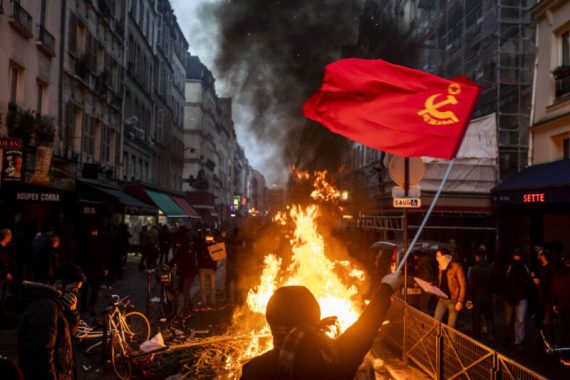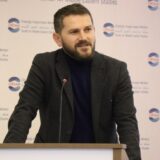V
iolent non-state actors (VNSAs) become involved in multiple economic activities including illegal and organized crime to retain their political and military capabilities. In contrast to legitimate and locally and internationally responsible actors, such as states, VNSAs have more possibilities to engage in black or illicit market relations and transnational activities. This is possible because there are no strong and established international mechanisms or regional cooperation to monitor and prevent these activities. This legal vacuum and the reality of several disintegrated/collapsed states in the Middle East and North Africa further generated favorable conditions for illegal economic activities like arms and human smuggling, drug trafficking, and money laundering.
Among other drug trafficking problems, narco-terrorism is a leading endemic challenge for both states and the international order. This black-market activity provides huge economic resources for VNSAs through which they can manage their military equipment and keep their influence over their followers via the social possibilities they gain. Looking at several cases, in particular the PKK terrorist networks and Hezbollah, they try to use these black market relations and criminal networks to receive huge amounts of easy money. Cutting this critical source and monitoring VNSAs should be a top priority for states and the international public in the fight against terrorism and any illegal violence.
PKK’s Narco-terrorism Reality
Since its emergence in 1982, the PKK and its affiliated groups try to maximize their financial profits through illicit methods including transferring heroin and other types of drugs specifically to Western countries. By cooperating with local branches in the Caucasus, the Balkans, and Africa, the PKK is involved in drug transportation by taxing these transfers and directly managing drug trafficking. According to several reports unveiled by national intelligence agencies and security forces, the PKK directly or indirectly has a role in transferring almost 80 percent of the total heroin used in Europe, revealing its easy and unproblematic outreach to European countries.
To complicate matters further, the profits gained from this illicit trade are probably transferred through PKK-affiliated groups active in European countries to launch terrorist attacks against Turkey. Both European institutions and reports and U.S. institutions have unveiled reports proving the active role of the PKK in drug trafficking, once again exposing the reality in which the PKK conducts its dirty and bloody terrorism. These activities not only threaten Turkish security but also compromise European security and the social mosaic at large.
To illustrate, the European Monitoring Center for Drugs and Drug Addiction (EMCDDA) and Europol’s EU Drug Market Report published in 2019, and the decision taken by the U.S. Treasury Department to blacklist several leading figures of the PKK-affiliated Kongra-Gel such as Cemil Bayik, Duran Kalkan, Remzi Kartal, Sabri Ok, and Adem Uzun in 2011 confirmed Turkey’s long-term criticism and warnings about the PKK’s organized crime networks which are heavily involved in black market relations.
Especially with the start of the Arab Spring and the disintegration of several states like Syria and Iraq, the PKK intensified its criminal activities and extended its networks in the Middle East region as VNSAs including terrorist organizations have found new safe heavens in these collapsed states. Through its traditional networks in Iraq and Iran and new ones in Syria, the PKK intends to control this route and extend these activities to the southern Turkish borders. Eliminating the PKK terrorism is only possible by cutting its narco-terror networks which now extend to other countries. Against this background, Turkish successive operations in Syria and Iraq against the PKK terrorism not only ensure stable and secure local and regional relations and environment, but are also possibly the most strategic and deadly strikes to the cross-border drug trafficking managed by the PKK and its affiliates.
Funding “Resistance” with Illicit Instruments
Hezbollah is claimed to be involved in several different illegal enterprises like smuggling, the diamond trade, fraud, money laundering, and drug trafficking. Several reports, articles, figures, and even the U.S. and Israel often claim that Hezbollah has extensive criminal networks in several regions including North America, South America, and the Middle East to raise money through the black market. In addition to its financial resources from Iran, expatriates and donations from Shia communities living in several regions including Canada, Latin America, and several European countries, and taxation in Hezbollah-controlled areas in Lebanon, this so-called resistance group also conducts illegal activities.
Operating these activities from areas like the Beqaa Valley and South Lebanon, the group extended its activities to the Iraqi and Syrian borders following the collapse of the existing states there. Weapons smuggling to Hezbollah through Iraq and Syria became easier following the power vacuum in these countries and Iran’s direct geographical outreach to Hezbollah. It is also claimed that Iraq and Syria turn a blind eye to illicit trade relations including drug trafficking.
The serious accusations and reports on the deep illegal activities of Hezbollah-affiliated groups and figures in South America are of special interest. Considering that there are pro-Hezbollah Shia groups in several Latin American countries, which have been facing a narco-terrorism problem for a long time, Hezbollah-affiliated groups and figures have a role in these clandestine and transnational criminal activities including drug trafficking. Hezbollah affiliates earn dirty money and launder it via several charities and with the help of Hezbollah’s control of the Lebanese financial and banking system. This money comes from drug production in the Beqaa Valley which is one of the largest opium and hashish-producing regions in the world.
As a result, some analysts have gone further and identified Lebanon as a narco-state due to Hezbollah’s illicit transnational activities. In other words, Hezbollah is claimed to have transferred huge amounts of drugs and cocaine to several Latin American countries and laundered this dirty money by using its “legal” political networks in Lebanon. In this way, possibly much more than Iran’s financial assistance, the amount of which was already diminished owing to Iran’s worsening economic hardships, Hezbollah found new and more effective ways to fund its now extending military activities, economic initiatives, and social efforts.
Recommended
To conclude, there are strong indications that both the PKK and Hezbollah are exceptionally active and embedded in black market relations and transnational organized crime. Actors like the PKK and Hezbollah consider the maintenance of their military-political power as a top priority irrespective of the means through which they fund this power. Therefore, they do not shy away from using black market relations to retain their status. In addition, the lack of stronger international enforcement mechanisms, regional cooperation and, more importantly, the reality of collapsed states enable these actors to intensify their illicit activities including drug trafficking.
Not having any national and international responsibility, these actors use local and transnational affiliates to carry out their illegal activities. In the case of PKK terrorism, it has been revealed that its narco-terror activities are mainly focused on controlling the European market and consolidating its narco-power in disintegrated states like Iraq and Syria. Hezbollah, the so-called resistance and anti-Western and anti-Israel actor, benefits from drug trade especially in Latin American countries by using the hashish and opium from the Beqaa Valley and by controlling smuggling between Iran and Hezbollah-controlled areas.





